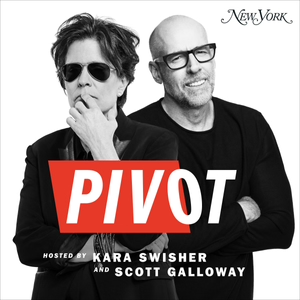
The Caixin-Sinica Business Brief, episode 58
07/30/18 • 18 min
Previous Episode

The Caixin-Sinica Business Brief, episode 57
Welcome to the 57th installment of the Caixin-Sinica Business Brief, a weekly podcast that brings you the most important business stories of the week from China’s top source for business and financial news. Produced by Kaiser Kuo of our Sinica Podcast, it features a business news roundup, plus conversations with Caixin reporters and editors. This week: We hear that China’s currency continued weakening last week and hit its lowest level in a year as escalating trade tensions between China and the U.S. eroded market sentiment. We analyze a new report that shows that China’s currency grew more international over the course of last year thanks to a sound Chinese economy and closer trade ties among countries participating in the Belt and Road Initiative. We find out that two U.S. companies specializing in hyperloop, a futuristic transport technology using high-speed pods zipping through sealed tubes, have secured funding from Chinese sources to advance their high-cost development. We learn that Britain has joined the U.S. and Australia in voicing concern about leading Chinese telecom-equipment maker Huawei, saying it has “only limited assurance” that the company’s products pose no national security threat. We discuss the rumors that Beijing could be contemplating a merger between China Telecom and China Unicom given that they have simultaneously announced a series of top executive moves. We discover that Chinese car-hailing giant Didi Chuxing is taking its service to Japan by launching a joint venture with Japanese conglomerate SoftBank. We note that English soccer giant Arsenal F.C. was duped out of $179,000 by a phony representative of China’s largest electric-vehicle maker, BYD. We are informed that China has received its first delivery of liquefied natural gas from one of the world’s most ambitious energy projects, in Russia, north of the Arctic Circle, just seven months after it began production. In addition, we talk with Coco Feng, business reporter with Caixin Global, about Google’s latest move in China. We also chat with Doug Young, managing editor of Caixin Global, about appliance maker Vatti, a Chinese sponsor of the World Cup champion that gave refunds to some customers after promising such rewards if France’s team won the tournament in a marketing campaign. We’d love to hear your feedback on this product. Please send any comments and suggestions to [email protected]. See Privacy Policy at https://art19.com/privacy and California Privacy Notice at https://art19.com/privacy#do-not-sell-my-info.
Next Episode

The Caixin-Sinica Business Brief, episode 59
Welcome to the 59th installment of the Caixin-Sinica Business Brief, a weekly podcast that brings you the most important business stories of the week from China’s top source for business and financial news. Produced by Kaiser Kuo of our Sinica Podcast, it features a business news roundup, plus conversations with Caixin reporters and editors. This week: We note that China’s central bank is set to appoint two new deputy governors in an effort to bring in more expertise to tackle systemic financial risks. We learn that the Hong Kong Stock Exchange is preparing to revise rules to crack down on the practice known as a “reverse takeover,” or “backdoor listing,” as part of efforts to clean up the market, improve the quality of listed companies, and offer better protection to investors. We hear that Medlinker, a Chinese social networking platform for doctors, has become the country’s latest unicorn with a new fundraising round that boosts its valuation to more than $1 billion. We find out that Chinese authorities are closing the loopholes that have allowed film and TV stars to minimize their tax payments after a furor over A-lister Fan Bingbing’s finances brought shady practices into the limelight. We discuss Starbucks’s ambition to enter China’s booming food-delivery sector by partnering with Alibaba's on-demand delivery service, Ele.me. We discover that Heineken is spending $3 billion to acquire a 40 percent stake in the owner of China’s biggest beer-maker, ramping up its efforts to tap into the world’s largest beer market. In addition, we talk with David Kirton, reporter for Caixin Global, about Germany's move to block Chinese company Yantai Taihai Group from buying a local producer of specialized machinery tools, which is seen as the latest sign that Berlin is toughening its stance on Chinese investments in strategic and security-related sectors. We also chat with Doug Young, managing editor of Caixin Global, about Google’s rumored return to China and the many controversies surrounding it. We’d love to hear your feedback on this product. Please send any comments and suggestions to [email protected]. See Privacy Policy at https://art19.com/privacy and California Privacy Notice at https://art19.com/privacy#do-not-sell-my-info.
If you like this episode you’ll love
Episode Comments
Generate a badge
Get a badge for your website that links back to this episode
<a href="https://goodpods.com/podcasts/the-caixin-sinica-business-brief-50379/the-caixin-sinica-business-brief-episode-58-12456189"> <img src="https://storage.googleapis.com/goodpods-images-bucket/badges/generic-badge-1.svg" alt="listen to the caixin-sinica business brief, episode 58 on goodpods" style="width: 225px" /> </a>
Copy




